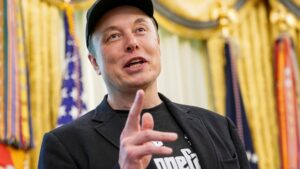Elon Musk’s Bold Stand Against Federal Spending: What It Means for Investors
At a recent press event at the White House, Elon Musk, CEO of Tesla and SpaceX, unleashed a scathing critique of a major tax-and-spending bill supported by President Donald Trump. Musk described the legislation as a “disgusting abomination,” arguing that it threatens to balloon federal budget deficits and impose a hefty debt burden on American citizens.
The Unfolding Controversy
In a candid post on his social media platform X, Musk expressed his frustration: “This massive, outrageous, pork-filled Congressional spending bill is a disgusting abomination.” He didn’t hold back, adding, "Shame on those who voted for it: you know you did wrong."
Musk’s comments sparked significant backlash, particularly from lawmakers who aligned themselves with the spending package. In a follow-up statement, Musk claimed the bill could drastically increase the budget deficit by a staggering $2.5 trillion, leading to “crushingly unsustainable debt.”
Response from Washington
The White House, however, was quick to dismiss Musk’s critiques. Press Secretary Karoline Leavitt emphasized that President Trump remains firm in his support for the bill, arguing that it does not contribute to the national deficit. The administration even accused the Congressional Budget Office of being biased in its findings that indicated a potential $3.8 trillion increase in the deficit over the next decade.
Divided Opinions Among Politicians
While Musk’s words struck a chord, particularly among fiscal conservatives, they also prompted a defensive response from some Republican lawmakers. House Speaker Mike Johnson, who championed the spending package, rebuffed Musk’s assertions, stating, “With all due respect, my friend Elon is terribly wrong about the one big beautiful bill.”
Interestingly, not all Republicans stood by the spending plan. Representative Thomas Massie of Kentucky, a noted fiscal hawk, expressed agreement with Musk, highlighting the deep divisions within the party. Even Senator Rand Paul, critical of extensive government spending, aligned himself with Musk’s perspective, emphasizing the dangers of accruing additional national debt.
What This Means for Investors
At Extreme Investor Network, we understand that such political debates could have significant implications for market dynamics and investor strategies. Here are a few key takeaways:
-
Monitoring Legislative Changes: Investors should stay informed about legislation that affects fiscal policies and government spending. Changes in budgetary allocations can lead to fluctuations in market segments, particularly in technology and infrastructure.
-
Long-term Economic Health: Growing national debt can impact interest rates and inflation, which in turn influences consumer spending and investment capabilities. Understanding these macroeconomic indicators is crucial for any sound investment strategy.
-
Political Sentiment: Public statements from influential figures like Musk can sway markets. The reaction of both the public and politicians to these comments could inform potential shifts in consumer sentiment and investor behavior.
- Sector Impacts: Sectors that rely heavily on government contracts or funding may be adversely affected by a tightening budget. For instance, defense or renewable energy sectors could see shifts depending on the outcomes of such legislation.
Conclusion
Elon Musk’s fervent stance against federal spending calls attention to crucial issues that resonate well beyond the realm of politics. For investors navigating the ever-evolving landscape, it becomes imperative to evaluate how these developments can influence their portfolios. As we move forward, keeping an eye on both fiscal policy and public responses may provide a competitive edge for informed investment decisions.
For more insights on navigating the complexities of innovation and investment in today’s market, stay connected with us at Extreme Investor Network. Your financial future is too important to leave to chance.

